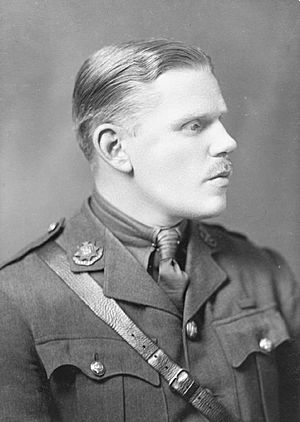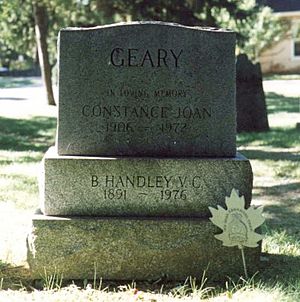Benjamin Handley Geary facts for kids
Quick facts for kids
Benjamin Handley Geary
|
|
|---|---|
 |
|
| Born | 29 June 1891 Marylebone, London, England |
| Died | 26 May 1976 (aged 84) Niagara-on-the-Lake, Ontario, Canada |
| Buried |
St Mark's Cemetery, Niagara-on-the-Lake
|
| Allegiance | Canada |
| Service/ |
Canadian Army |
| Years of service | 1914 - 1919 (UK) 1939 - ? (Canada) |
| Rank | Major |
| Unit | The East Surrey Regiment Royal Army Chaplains Department |
| Battles/wars | World War I World War II |
| Awards | Victoria Cross |
| Other work | Serjeant-at-Arms to the Ontario Legislature |
Major Benjamin Handley Geary (born 29 June 1891 – died 26 May 1976) was a very brave British soldier. He received the Victoria Cross, which is the highest award for courage in battle. This special medal is given to soldiers from the United Kingdom and Commonwealth countries.
Early Life and Joining the Army
Benjamin Geary went to school at Dulwich College Preparatory School and St Edmund's School, Canterbury. Later, he studied at Keble College, Oxford. After finishing college, he worked as a teacher at Forest School from 1913 to 1914.
When World War I began in 1914, Benjamin decided to join the army. He became a second lieutenant in the East Surrey Regiment. Soon after, he was sent to France to fight on the Western Front.
Winning the Victoria Cross
In April 1915, Benjamin Geary's unit was fighting in a very important battle. This battle took place on a small hill called "Hill 60" near Ypres in Belgium.
On April 20 and 21, 1915, Second Lieutenant Geary showed amazing bravery. He led his soldiers across open ground, even though the enemy was firing heavily. They joined other soldiers in a large hole, called a crater, at the top of the hill.
The crater was hit by many enemy shells, which destroyed their defenses. Throughout the night, the enemy attacked with bombs. The crater became full of injured and fallen soldiers. But Benjamin Geary kept fighting.
For most conspicuous bravery and determination on "Hill 60," near Ypres, on April 20th and 21st, 1915, when he held the left crater with his platoon... Each attack was, however, repulsed mainly owing to the splendid personal gallantry and example of Second Lieutenant Geary. At one time he used a rifle with great effect, at another threw hand grenades, and exposed himself with entire disregard to danger in order to see by the light of flares where the enemy were coming on. In the intervals between the attacks he spent his whole time arranging for the ammunition supply and for reinforcements. He was severely wounded just before daylight on 21st April.
Benjamin Geary used his rifle and threw hand grenades to stop the enemy. He bravely put himself in danger to see where the enemy was coming from. Between attacks, he made sure his men had enough ammunition and that more soldiers arrived to help. He was badly wounded in the head on April 21.
Life After the War
After being wounded, Benjamin Geary was sent back to England. He lost sight in his left eye, and his right eye was also badly affected. He was promoted to lieutenant.
Even with his injuries, he continued to serve. He worked with the Royal Flying Corps (the air force at the time). In 1918, he returned to fight in Italy and was wounded again. He left the army in 1919 as a captain.
Later, Benjamin Geary became a priest in the Church of England. He then moved to Canada. During World War II, he served in the Canadian Army and became a Major.
After World War II, he worked for the government in Ontario, Canada. He was the Sergeant-at-Arms for the Ontario Legislature from 1947 to 1971. This role involves keeping order during meetings. He passed away in 1976 and is buried in Niagara-on-the-Lake, Ontario.
His Medal
Benjamin Geary's Victoria Cross and his other medals are now on display. You can see them at the Canadian War Museum in Ottawa, Ontario, Canada.
 | Isaac Myers |
 | D. Hamilton Jackson |
 | A. Philip Randolph |


